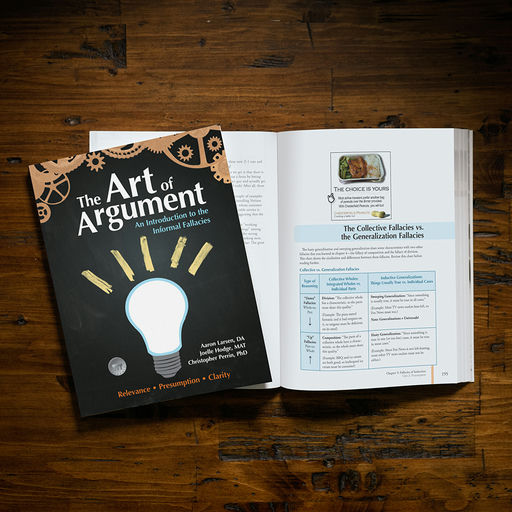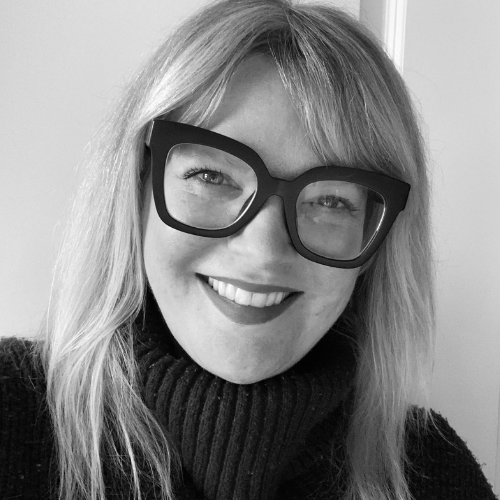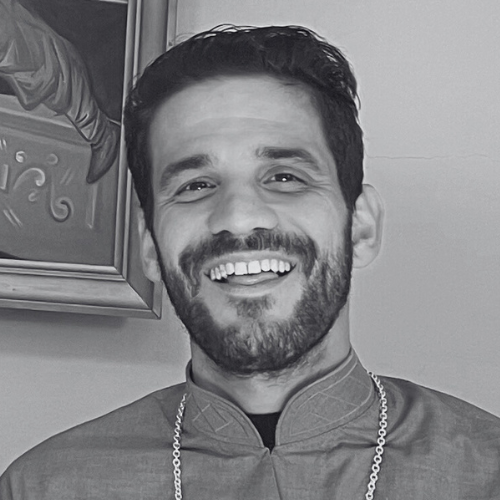Art of Argument: Informal Logic

Required Materials:
Books and supplies are not included in the purchase of the course.
- The Art of Argument: An Introduction to the Informal Fallacies 20th Anniversary 2023 Edition
- MLA Handbook for Writers of Research Papers
- A binder or notebook for keeping track of daily class notes.

Ms. Ash White
[email protected]Ash White holds a BA in English and Theatre from Mary Baldwin University, and has taught literature, writing, and logic at the middle and secondary levels for twenty years. Ms. White is passionate about classical education and homeschooling. She and her husband Jon live in the Shenandoah Valley and are voracious lovers of books and music. If you visit their home, you'll find it difficult to determine which collection is largest: books or vinyl records!

Fr. Gabriel Souza
[email protected]Father Gabriel Souza was ordained to the Holy Priesthood by His Eminence Metropolitan Hilarion of blessed memory in February of 2021. He currently serves under the Omophorion of His Eminence Metropolitan Nicholas of Eastern America & New York in the First Hierarch of the Russian Church Abroad. Fr. Souza’s education and priestly formation prepared him to serve in various positions as an educator, director of religious education and faith formation for youth and young adults, and pastoral counselor. With strong interpersonal skills, he builds and develops strong relationships with parishioners and students.
Passionate about working with youth and leading the liturgy and prayers of the church, it is through teaching and preaching that his passion for Jesus truly comes alive. He enjoys spending time with my very close-knit family and socializing with my friends- especially other clergy. Reading, traveling, learning about the great treasures of Orthodoxy, meeting people, and learning about and experiencing different cultures are also the great joys of his life.

Mr. Jimmy Schambach
[email protected]Jimmy Schambach holds a Master of Divinity from Regent University, and a BA in theology and philosophy from Evangel University. Currently, he works as the executive director of a faith-based nonprofit organization called M28 Ministry, which operates out of Harrisburg, Pennsylvania. In his past, Jimmy worked as a youth and young adult pastor at a large church in Indianapolis, Indiana. Since his time in college, Jimmy has grown in his love for philosophy, logic, and theology. He has taught in many settings over the years and enjoys his classes at Scholé Academy. Jimmy and his wife, Tristin, live in Camp Hill, Pennsylvania, where they have a young daughter named Aviana and a dog named Panda.

Mr. Peter Belfry
[email protected]Peter Belfry has a range of teaching and tutoring experience in a variety of subjects and age levels from kindergarten through to adult education at the college level and has taught at several classical, Christian and public schools. He has enjoyed having the experience of teaching Programming and Logic classes to students, which ties well to his background in philosophy and computer science. In addition to serving as an instructor with Schole, Peter serves as a professor of Computer Science and Video Game Development with Canadore College, teaching courses on Operating Systems and programming languages such as Windows, Linux, HTML, CSS, C++, C#, and Visual Basic as well as Artificial Intelligence, Object Oriented Programming, Mathematics, Business and Workplace Skills. Peter holds an Honors BA from Trent University in History as well as a BA in Education, specializing in History and Computer Science. He holds an MA from Knox Theological Seminary in Classical and Christian studies, which provides him a background for teaching from a classical perspective. For his MA program, he read and reflected on many of the Great Books as well as studied Scripture and church history. Peter has completed a week-long teacher training with the Association of Classical Christian Schools and Rockbridge Academy. His favorite piece of classical literature is Dante’s The Divine Comedy.
In addition to teaching, Peter also has experience serving in a pastoral role and enjoys volunteering to serve in his local church and community. He helps in evangelistic outreach as well as teaching lessons from the Bible. Peter has experience and training as an English as a Second Language instructor as well. He has experience teaching both online and in person. He believes in Scholé’s approach in seeking “restful learning” and believes that education should be life-giving and freeing for the soul as it should acknowledge the Lord Jesus as the source of all that is true, good and beautiful. Peter lives in the North Bay, Ontario area with his wife, twin boys, and baby girl.
Peter has explored the subject of finances through reading and personal application, learning to make sound financial decisions in his own life. His passion for financial stewardship, combined with his teaching experience in business, careers and mathematics, equips him to guide students in developing practical financial wisdom. He cares deeply about helping others grow in their understanding of stewardship and responsible money management.
Peter teaches the following classes: The Art of Argument: An Introduction to the Informal Fallacies, Formal Logic: The Discovery of Deduction, The Logic of Computer Programming, The Art of Computer Programming, and Faithful Stewardship: A Christian Guide to Personal Finance and Investments.
Quarter 1
- What is Logic: Critical Thinking as a Way of Life
- Formal vs. Informal Logic
- Fallacies of Relevance: Ad Fontem Arguments
- Fallacies of Relevance: Appeals to Emotion
Quarter 2
- Continue Fallacies of Relevance: Appeals to Emotion
- Fallacies of Relevance: Red Herrings
- Unit 1 Cumulative Fallacy Assessment
Quarter 3
- Fallacies of Presupposition
- Fallacies of Induction
- Unit 2 Cumulative Fallacy Assessment
Quarter 4
- Fallacies of Clarity
- Unit 3 Cumulative Fallacy Assessment
- Final Exam
- Final Project
![]() Computer: You will
need a stable, reliable computer, running with a processor with a speed of 1 GHz or better
on one of the following operating systems: Mac OS X with Mac OS 10.7 or later; Windows 8,
7, Vista (with SP1 or later), or XP (with SP3 or later). We do not recommend using an
iPad or other tablet for joining classes. An inexpensive laptop or netbook would be much
better solutions, as they enable you to plug an Ethernet cable directly into your computer.
Please note that Chromebooks are allowed but not preferred, as they do not support certain
features of the Zoom video conference software such as breakout sessions and annotation,
which may be used by our teachers for class activities.
Computer: You will
need a stable, reliable computer, running with a processor with a speed of 1 GHz or better
on one of the following operating systems: Mac OS X with Mac OS 10.7 or later; Windows 8,
7, Vista (with SP1 or later), or XP (with SP3 or later). We do not recommend using an
iPad or other tablet for joining classes. An inexpensive laptop or netbook would be much
better solutions, as they enable you to plug an Ethernet cable directly into your computer.
Please note that Chromebooks are allowed but not preferred, as they do not support certain
features of the Zoom video conference software such as breakout sessions and annotation,
which may be used by our teachers for class activities.
![]() High-Speed Internet Connection:
You will also need access to high-speed Internet, preferably accessible via Ethernet
cable right into your computer. Using Wi-Fi may work, but will not guarantee you the optimal
use of your bandwidth. The faster your Internet, the better. We recommend using a connection
with a download/upload speed of 5/1 Mbps or better. You can test your Internet connection here.
High-Speed Internet Connection:
You will also need access to high-speed Internet, preferably accessible via Ethernet
cable right into your computer. Using Wi-Fi may work, but will not guarantee you the optimal
use of your bandwidth. The faster your Internet, the better. We recommend using a connection
with a download/upload speed of 5/1 Mbps or better. You can test your Internet connection here.
![]() Webcam: You may
use an external webcam or one that is built in to the computer. Webcam Recommendations:
Good (PC only) | Best (Mac and PC)
Webcam: You may
use an external webcam or one that is built in to the computer. Webcam Recommendations:
Good (PC only) | Best (Mac and PC)
![]() Headset: We recommend
using a headset rather than a built-in microphone and speakers. Using a headset reduces the
level of background noise heard by the entire class. Headset Recommendations: USB | 3.5mm
Headset: We recommend
using a headset rather than a built-in microphone and speakers. Using a headset reduces the
level of background noise heard by the entire class. Headset Recommendations: USB | 3.5mm
![]() Zoom: We use a web
conferencing software called Zoom for our classes, which enables students and teachers to
gather from around the globe face to face in real time. Zoom is free to download and easy
to use.
Zoom: We use a web
conferencing software called Zoom for our classes, which enables students and teachers to
gather from around the globe face to face in real time. Zoom is free to download and easy
to use.  To
download Zoom:
To
download Zoom:
- Visit zoom.us/download.
- Click to download the first option listed, Zoom Client for Meetings.
- Open and run the installer on your computer.
- In August, students will be provided with instructions and a link for joining their particular class.
![]() Scanner: In this
class, students frequently submit homework assignments by scanning pages from their workbooks.
Students and/or their parents should have easy access to a scanner and the ability to use it.
Scanner: In this
class, students frequently submit homework assignments by scanning pages from their workbooks.
Students and/or their parents should have easy access to a scanner and the ability to use it.
Step 1
Step 2
Step 3
Step 4
Explore our courses!
First, read the available course descriptions, noting prerequisites, target grades, and course objectives. If you think your student is prepared for the course, go ahead and register. After registration, a placement assessment may be provided to students, depending on the course and the student's previous enrollment with Scholé Academy. Registration is finalized when the student's placement assessment has been returned by the course instructor with placement confirmation.
All Courses | By Grade
Read the Student-Parent Handbook.
Please take careful note of our teaching philosophy, our technology requirements, our school policies, the parent agreement, and the distinctions between our grade levels.
Double-check the course section dates and times.
Make sure they don't conflict with other activities in your schedule or other courses you are purchasing. Our system will not catch double-bookings!
You're ready to add course selections to your cart!
Our Assistant to the Principal will be in touch with you after your enrollment to help you with next steps, including any placement evaluations that may be required for your course selections.
This registration will be finalized when the student's placement assessment has been returned by the course instructor with placement confirmation.
